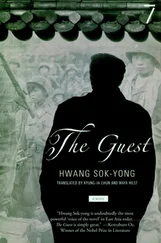The two vehicles passed through the marketplace and crossed Le Loi Boulevard, heading north into a residential neighborhood with palms and wisteria vines lining the streets. The wagon stopped in front of a huge iron gate painted white and honked. The gate opened and three men came out. One was a thin Vietnamese with long hair and the other two were Koreans, both looking sturdy and wearing T-shirts. They let the car pass inside and shut the gate.
There was a small flowerbed in the yard, but it was clear that what was once a garden had been paved over with cement. Two broadleaf trees had been left standing to shade the windows of the house, but the earth was turned up near their roots. On the right side of the yard a storage building had been built with cinder blocks. The Vietnamese opened the door. Inside there were piles of goods.
“Welcome,” said a Korean with a crew cut to the master sergeant from the PX. “Let’s go inside, the president has been waiting for you.”
They started unloading the crates from the truck. The living room of the house was almost too cold from the air-conditioning. The only furniture in the spacious room was a black sofa and a table with chairs. A map of downtown Da Nang was tacked on one wall, and next to it a list of vehicle numbers. The vehicles were divided into civilian and military and details were recorded on their size, color, etcetera. For example, according to the list the mayor of Da Nang had an open Jeep with such-and-such license number and Colonel Nguyen Tanh Bhatt drove a black sedan with license number such-and-such.
There had been a game of mahjong; tiles and money were scattered over the table. Snake, the staff sergeant with the CID detachment, was among the group. The chairman had his hair greased and neatly combed back and was wearing the white linen suit favored by high-ranking government officials in Vietnam.
“I’m Lieutenant Colonel Pak,” said the chairman without extending his hand. The master sergeant snapped to a position of attention.
“I’ve heard a lot about you, sir.”
They all sat down. The chairman, supposedly a lieutenant colonel in the reserve, asked, “Mr. Oh, what are the goods?”
“We have ten electric fans and three refrigerators, sir.”
“Peanuts,” said the chairman with a soft laugh. “Anyway, you guys have worked hard. Hey, bring them something cold to drink.”
“You met our kid, didn’t you?” the staff sergeant asked.
“Yeah, he helped us get through the checkpoints,” replied the master sergeant.
“Too much red tape. Why not just get us each an ID?”
“Sure. So you could run all the way to Saigon?”
“It was a joke. Too much stress for a five-hundred-dollar job, that’s what I meant to say.”
“Listen, five hundred is the price of a dozen soldiers’ lives.”
“That’s why we never kill each other. We love peace, that’s what I say.”
The staff sergeant and Oh were about the same size, but their voices were completely different. Oh’s was much shriller and his speech faster.
“Don’t be so difficult. While you’re well-positioned, why not lend us a hand,” said the chairman. “By the way, how come beer and cigarettes are so hard to come by?”
“They arrive only twice a month.”
“Hmmm. Let’s make a deal on them, then.”
But the sergeant was not an easy mark. “Special items like that are in high demand everywhere in the market.”
The PX chief liberated the goods, the staff sergeant got them downtown, and there the Hong Kong Group was in charge of selling them. Now the chief was saying that cigarettes and beer, unlike luxury items, could easily be sold in the market, and that their group should stay out of it. The chairman gave the staff sergeant a sly look.
“We have a channel for selling to the clubs. Shall I let you in on a secret?”
The chairman paused, taking a few leisurely sips of his juice.
“Even if you try to feed the market a large quantity at one time, nine times out of ten the cash doesn’t get recycled fast enough or there’s a shortage of military currency. The main thing is to get the money safely and securely. The solidarity of the Vietnamese businessmen is fierce. If you push against their front, they’ll take all the beer there is and then cut the price in half. To form and support the market price, we’ll have to cooperate. In Da Nang there are about thirty bars, four clubs, three hotels, and the tearooms and sidewalk cafes, and they all sell beer. Beer doesn’t go into the market. All we have to do is get a hold on the outlets. We’ll stockpile the goods and unload them a little at a time. What do you say? They can pay us cash for each transaction or wait until the deliveries accumulate to a pallet and then pay a lump sum.”
“It’ll leave no trace,” said the staff sergeant, nodding.
“You see, one pallet is eighty boxes. And a truck can carry three pallets. How many cans in 240 boxes?”
“It’s 4800 cans, sir.”
“That alone should affect the price. Suppose there are twenty pallets pouring out each day from wherever, that’d depress the market price. Then we should get them to discriminate among the brands, make a brand rare and inflate its price. After all, it’s the taste of the Vietnamese that’s important to us. Then we can supply the rare item at a better price than the other brands.”
“Like Salem cigarettes, you mean?” Oh asked.
“Exactly, Salem brings twenty cents more a pack than Pall Mall, Winston or the other filtered brands. Mr. Oh, there’s something similar with beers, isn’t there?”
“Yes, sir. It’s the one called Hamm’s.”
“Right. We’ll only deal in Hamm’s. We can feed it directly to the bars and clubs.”
The master sergeant listened, nodding, and then checked his watch. “I’ve got to get going. .”
“How about getting the money for this at the next deal?” Oh said, but the chairman shook his head.
“No, on the battlefield there’s no tomorrow. It’s got to be a head-to-head collision. Isn’t that right?”
“Of course, sir,” said the master sergeant with a grin, looking relieved.
The chairman took out a roll of military currency from the inner pocket of his jacket. The sum had been counted in advance, mostly in thirty-dollar notes.
“Here’s the deal. . as a rule, we pay shares of profit after the goods have been disposed of, but I’ll pay you that this time as well.”
The chairman counted out the profit, which was calculated separately. “The market price for a refrigerator ranges from $200 to $250 dollars.”
“They’re Hitachis, medium-sized.”
“Then, they go for $200. You paid eighty a piece, right? That makes a profit of $360. What about the fans?”
“Sony, twenty dollars each, sir,” announced Oh, who was standing by to assist.
“Then the principal cost is 200, that’s correct. Then, since the market price is forty, the profit will be 200. Our take is $560, then, right?”
“Divided in half will be $280, sir.”
The chairman counted $280 and handed it over to the master sergeant, and then gave eighty dollars to the staff sergeant.
“Here’s the fee for the ID.”
“This is nothing.”
“You should pay, too.”
The PX chief also took out eighty dollars and handed it to the staff sergeant.
“Hell, it’s peanuts. .”
“We’re the ones who should be complaining. Driving the car and sweating to death for a measly $200,” Oh grumbled.
“I have to get going.”
“What do you say, about the business I mentioned. .?”
“I’ll think about it.”
“This is our first deal with the Korean soldiers,” the chairman said as he saw the master sergeant out. “The Americans, once you level with them, never any mistakes with those kids.”
Читать дальше












